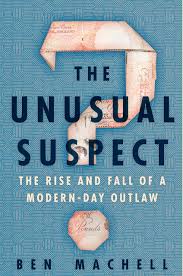 Character is key in almost any book. This was brought home to me recently when I read and really enjoyed The Unusual Suspect by Ben Machell after having encountered several other true crime books that simply didn’t satisfy. The trend today is to serve up an unsolved mystery and slather it with internet speculation and/or trial transcripts. there may be a few satisfying crime books, fact or fiction, where you never find out who dun it, but it’s certainly very few. I won’t name names, but if you write a book about say, a person who evidently either killed themselves or was murdered in a flamboyant fashion, it’s important to know their character to decide which of the two were more likely, something a journalistic “just the facts” approach doesn’t provide.
Character is key in almost any book. This was brought home to me recently when I read and really enjoyed The Unusual Suspect by Ben Machell after having encountered several other true crime books that simply didn’t satisfy. The trend today is to serve up an unsolved mystery and slather it with internet speculation and/or trial transcripts. there may be a few satisfying crime books, fact or fiction, where you never find out who dun it, but it’s certainly very few. I won’t name names, but if you write a book about say, a person who evidently either killed themselves or was murdered in a flamboyant fashion, it’s important to know their character to decide which of the two were more likely, something a journalistic “just the facts” approach doesn’t provide.
One of the good things about the Unusual Suspect is that Machell not only slowly delineates a complex, unusual Englishman named Stephen Jackley through his acts and thoughts, but also provides a much more nuanced portrayal than expected. To judge the book by its subtitle and jacket copy, it’s the tale of a brilliant criminal, another Scott Scurlock, the subject of Ann Rule’s The End of the Dream, a wily, methodical, highly successful bank robber who lived the surfer lifestyle to the bitter end. Jackley probably read that book, and if Scurlock was a Peter Pan, he aimed to be Robin Hood, raising vast sums in order to create a foundation with an ambitious social agenda. For all the obsessive thought lavished on them, however, his plans ware usually neither realistic nor very successful.
It doesn’t take an especially astute reader to soon figure out that Stephen is clearly on the autism spectrum. It would be charitable to say that the fact he was never officially diagnosed as such until relatively recently is because people were less aware of the condition at the turn of the 21st century, but the cold truth is that because of his precarious social and economic situation he was practically invisible. Until he began his armed robberies, that is.
Although highly functional, his inability to process information in the common way caused a certain lack of direct empathy that warped his idealistic desire to help mankind by looting corporations into an erratic crime spree that mostly frightened actual people. Far from the master criminal the American authorities and his own fantasies made him out to be, he was mostly good at running away, which is a necessary part of robbery, but not the only one.
The indignities this clearly damaged individual received at the hands of the American authorities is maddening, as Machell alternates Stephen’s misadventures in confinement with the erratic path that led him there. Thanks to complete access to the erstwhile Robin Hood’s writing and current outlook, the book is able to take us directly into his mind while still maintaining a telling objectivity. It’s a standout performance, the very model of character based true crime. (Jamie)